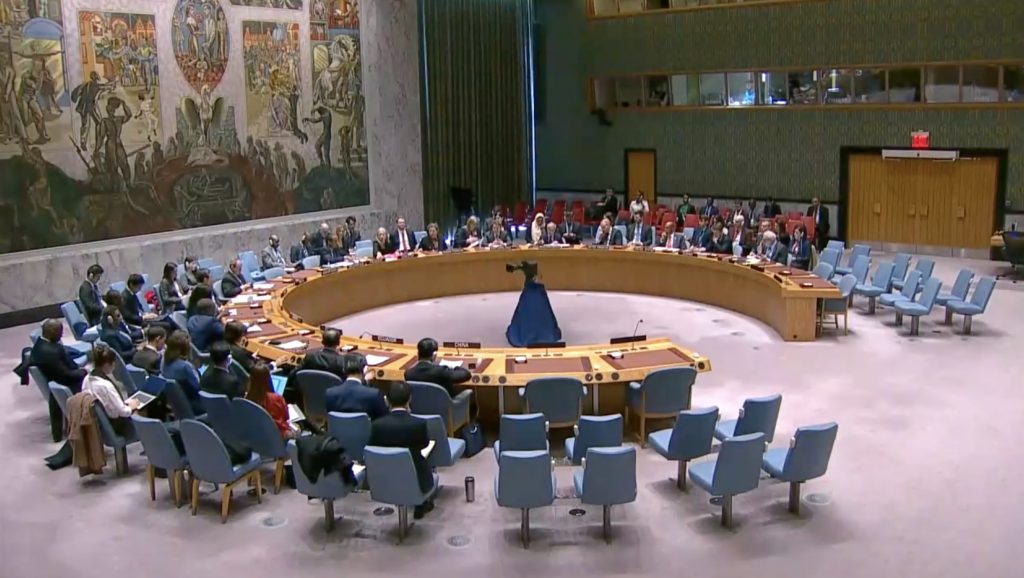Statement by Deputy Permanent Representative Anna Evstigneeva at UNSC briefing on the situation in the Democratic Republic of the Congo
Mr.President,
We thank SRSG Keita for the briefing. We welcome Permanent Representatives of the DRC, Rwanda, and Burundi to this meeting.
We also thank our colleagues from Gabon and France for briefing us on the UNSC visit to the DRC on 9-12 March this year. We appreciate the efforts of the UN Secretariat and MONUSCO to organize this important country visit, which turned out very useful in terms of reaching a better understanding of the domestic processes in DR Congo. We say thank you to the Congolese authorities for a very friendly reception and openness to a frank and meaningful dialogue. Most importantly, we were able to go to the east of the country and in particular to Goma, the capital of North Kivu, where the situation remains tense. At this hard time, Security Council’s visit turned out absolutely critical.
We closely follow the developments in eastern DRC. We are deeply troubled by another spiral-up of the crisis related to the intensifying activities of M23, whose offensive steps exacerbated the humanitarian crisis, led to an increase in the number of IDPs and refugees, violated human rights and bestowed suffering upon civilians. The governmental forces of the DRC, as well as MONUSCO and East African Community (EAC) forces have to focus mostly on pushing back M23. Against this backdrop, other illegal armed formations, first of all the Allied Democratic Forces, CODECO, Mai-Mai, the Democratic Forces for the Liberation of Rwanda, and RED Tabara make use of the situation to enhance their positions in the east of the country, which raises much concern.
A threat of escalation in the bilateral relations of the DRC and Rwanda gives one more reason for strong concern.
We are convinced that today our priority task is to make the hostilities stop, and establish an inclusive dialogue for all parties to the conflict. In this regard, we look forward to effective steps by DRC’s neighbors in the Luanda and Nairobi formats that should aim at a joint search for solutions and attaining a lasting settlement.
We welcome the commitment of the DRC government to negotiating with the armed groups at the political track of the Nairobi process. We take note that the next round is anticipated to convene in the DRC. Also, we pay tribute to the East African Community for its efforts to countries who contribute troops to the EAC Regional Force.
We note the importance of conjugating efforts and ensuring effective coordination of the Nairobi and Luanda processes in order to create conditions for inter-Congolese dialogue and also recover Kinshasa-Kigali bilateral relations. We hope that the understandings that were achieved at the recent EAC summits will bring the region closer to normalization and back to the agreed frameworks, including the Luanda roadmap.
We consider it necessary to continue working on the full implementation of the fundamental 2013 Peace, Security and Cooperation Framework for the Democratic Republic of the Congo and the Great Lakes Region. We support the efforts of the Special Envoy for the Great Lakes Region Huang Xia to establish an interstate dialogue in order to reduce tension in this part of Africa.
Political solution will allow for a comprehensive cessation of hostilities and create real conditions for a lasting stabilization. At the same time, we are convinced that Kinshasa also needs to double its efforts to form effective armed forces, law enforcement, and other state institutions. In current complex circumstances, both global and regional, this is a necessary requirement needed for implementing an independent foreign and domestic policy, solving challenging national tasks that arise from the tragic history of the country, and also for controlling national natural resources that must be used to the benefit of the Congolese nation. We welcome that last year the notifications regime with regard to deliveries of military use products to the DRC was cancelled.
We reiterate our general support for the efforts of MONUSCO, its leadership and peacekeepers. We thank them for working in the hard conditions and for their commitment to protecting civilians. We extend condolences to the South African Republic that has lost a peacekeeper at the beginning of February. We strongly condemn any attacks on and provocations against the Blue Helmets and UN civil personnel. We hope that all issues of pertaining to provision of the Mission with resources, first of all material and technical equipment, will be resolved expeditiously and effectively.
Presence of MONUSCO peacekeepers in the conflict zone is an important stabilizing factor. We believe that the Mission needs to focus on its central mandated tasks. We count on the enhancement of coordination between the DRC armed forces and MONUSCO, as well as other regional and national mechanisms that take part in conflict settlement with a view to ensuring better protection of the Congolese civilians.
As for the implementation of the joint transition plan for a staged downsizing of the Mission and its complete withdrawal by 2024, we believe we must proceed from the developments on the ground, act in a step-by-step responsible manner, and maintain close contacts with the DRC government on this matter.
We note the significant role of organizations of the UN system, including UNHCR, WFP, FAO, and others in alleviating the dire humanitarian consequences of the crisis, which the members of the Security Council saw with their own eyes in the east of the DR Congo.
In conclusion, we welcome the continuous efforts of the DRC government to prepare for general elections in December 2023. We hope that Kinshasa, with the support of MONUSCO and regional assistance, will be able to create conditions for organizing a vote that meets international standards and the aspirations of all Congolese citizens.
Thank you.
